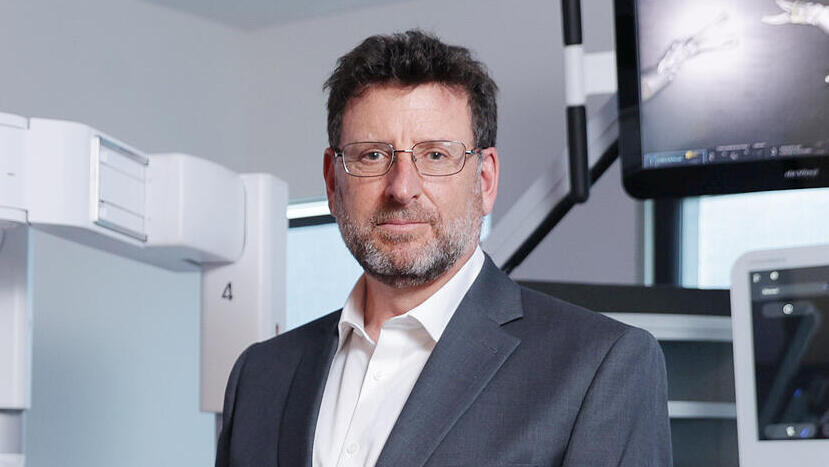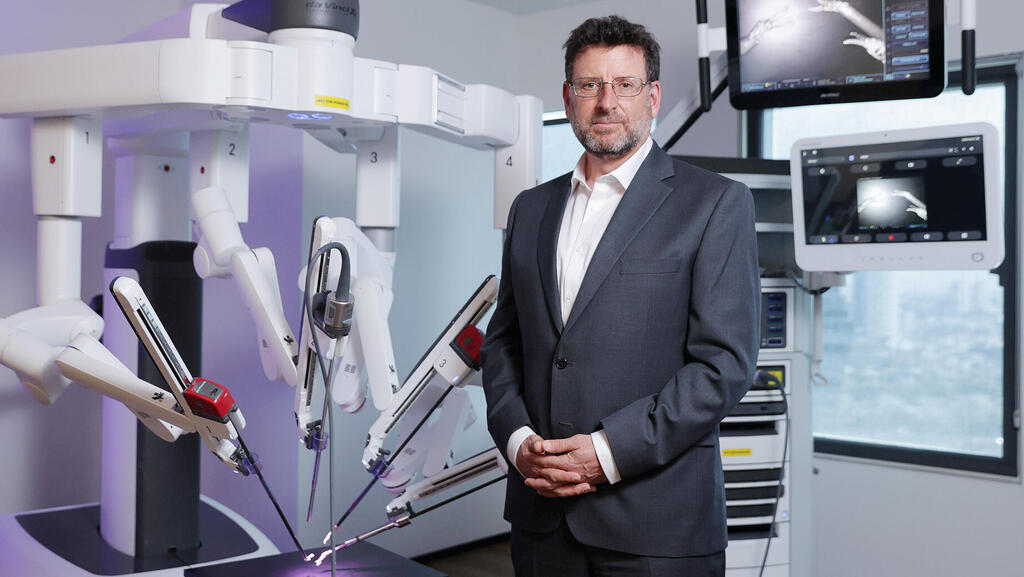
Interview
Revolutionizing operating rooms with robots
Robotics will not replace the human surgeon, but will make them better than ever, explains Gary Guthart, CEO of healthtech giant Intuitive Surgical, developer of the da Vinci surgical system. In a special interview, he reveals how doctors can be persuaded to trust robots, and how Covid-19 accelerated their integration into operating rooms
"In future decades, a large part of medical treatment will be done with the assistance of computing, imaging and robotics," says Gary Guthart, CEO of robotic surgery giant Intuitive Surgical, when we meet in Tel Aviv.
"Computed interventions will help reduce variability in operating rooms around the world, by making every surgeon's performance as good as the best. Will it be better than the best surgeon in the world? Hard to claim that. Can it improve the performance of the average surgeon? Absolutely. That's what robotics has done."
Guthart, who is in Israel for the opening of Intuitive's new offices in Tel Aviv, is not overstating its importance. More than anything, the company's systems remind me of Sci-Fi movies.
Intuitive's flagship system, called da Vinci, assists surgeons in performing surgical procedures using precision robotic arms that act with minimal invasion: the heart of the system is a console that presents the surgeons with a sharp, enlarged 3D display of the surgery area, in a way that helps them identify its structures and better understand its anatomical state. At the same time, the console interprets the surgeon's hand movements to robotic arms that perform the procedure through minimal incisions. The software even provides real time alerts, guidance and information that assist decision making in the operating room. In the end, Intuitive produces analytics of the system's performance that provide deeper understanding of the process as well as insights for the future. The company's technology is used by a number of hospitals in Israel, amongst them Rabin (Beilinson) Medical Center, Sheba (Tel-HaShomer), Sourasky (Ichilov), Soroka, Rambam and others.
When asked if this technology doesn't threaten so called "senior surgeons", Guthart smiles. "Our products have been in clinical use since 1999, and the attitude towards them varies by country and surgical specialty. There are parts of the surgical community that see new technologies like ours as an opportunity to improve, and they are your first adopters, like urology or gynecology. But there are also well established surgeons in the field that resist and say: I don't need a robot, I'm the LeBron James of the field."
What do you answer?
"My argument to them is never 'you must use the robot', because it's not true. I will say 'you may be the LeBron James of your field, but not every basketball player is LeBron James'. I don’t disagree when they say 'I don't need it', but when they say 'nobody needs it', I present them with the data demonstrating the gap that exists in surgical performance, and prove that our products make a difference; they make the average surgeon as good as the best. That's the point."
I assume it's not only surgeons, doctors and patients who are apprehensive about the robots, but regulators too.
"The regulatory approach is not harmonized: the EU's approach is different from that in the United States, which is different from Japan's and China's, but I don’t remember a case where we weren’t somehow ultimately able to come to an agreement with regulators. It tends to be a discussion over the path and the method, rather than a 'yes or no' argument.
"One of the biggest things driving the development of robotic-assisted surgery is the use of electronic medical records, a field in which Israel is quite advanced, because it makes it possible to answer more questions. We're finally at a point where hospitals can look at their own data, across their own patient population, across their own surgeon population, and assess the quality of surgery. This is the most powerful and influential thing that has happened in healthcare in the last decade, an amazing revolution really."
"The market has a lot of opportunity. One company will not control it all"
This isn't Guthart's first visit to Israel. Two years ago Intuitive acquired Orpheus Medical, a start-up that developed a system for surgical video management. Over the last year, the company has deepened its local Research and Development activity and opened two R&D centers in Haifa and in Tel Aviv, with about 50 employees.
What led you to invest in Israel out of all places?
"The human capital. We were looking to compliment our team outside our headquarters in Silicon Valley, California. We were looking for diversification of our talents, specifically in machine learning in health care, and it is well known that many talented people are here. We were lucky to find Orpheus; it was a great match."
Is the search related to the fact that you may lose your so-called "monopolistic" status in robotic-assisted surgery when giants like Alphabet (Google) and Johnson & Johnson enter the field?
"I disagree with the definition of a monopoly," he laughs. "The process in which different players are interested in robotic-assisted surgery has been going on for a long time. The need for better healthcare and acute intervention is quite clear, and that's why more and more players enter that market. So the idea that 'all of a sudden a big player was coming in is not what happened."
What is going to happen when people like Jeff Bezos and Elon Musk discover the untapped treasure called "health systems"?
"There are many opportunities in the field, and they are really varied. I don’t think a single company will come in and dominate the market. One company won’t figure it all out. At Intuitive we made it our mission to make acute interventions in operating rooms much better for the patient and for the staff, and to lower the total cost of treatment as well. I don’t think Amazon or Google will run to the field as their first application, so I'm not concerned. On the contrary, it may be that they will build great tools that all of us can use."
"When they started operating again, demand for minimally invasive procedures soared"
Today's hottest trend in technology is interdisciplinary: combining robots with artificial intelligence, machine learning and big data. Is that the next big challenge?
"Hospitals today work to improve four parameters: treatment outcomes, patient experience, staff experience and lowering the cost of treatment. We supply technology that can help them achieve these goals. In the past I sold a client medical products – robotic scalpels, scissors or endoscopes – and he would know how to use them. Now we want to integrate this whole set of products and help the customer use it, in order to improve in all of those four parameters.
“Of course, computing, AI and ML can make a vast difference, and still you have to touch the patient, the live tissue. We work a lot on the ways we can incorporate these technologies in our products and services. We've done a lot in the field of IoT, 'the Internet of Things': we are cloud-connected to robots in operating rooms for over a decade. If we start bringing data back, we can start looking at trends, we can help hospital efficiency with faster training, we can help change the operating room outcome for the better."
Related articles:
How did Covid-19 affect the company?
"In the early waves of the pandemic, hospitals conserved their resources, in some cases converting operating rooms, ICU's and staff for Covid treatment. As waves peaked, you would see surgeries get delayed. Interestingly, we found hospitals coveted minimally invasive surgeries that require smaller incisions, because large incisions consume more hospital resources. So as they came back to operating, they opted for using our operating console because it consumes fewer resources during an operation and in the follow-up.
"For the company, what that meant is that we had to be agile and to adjust. Because we are a medical company we felt an obligation to aid hospitals, which is why we converted our factories to make personal protective equipment, then in short supply, and donated it. As surgeries started coming back, we first created customer relief programs, in which we refunded or deferred payments. Customers with financial constraints didn’t have to spend money on things they couldn’t use.
"Later, we started to shift our machines around to help them manage procedures. For example, if a hospital wanted to dedicate an area to Covid-19 treatment, and simultaneously dedicate another area to patients who need surgery, we would move our systems from one place to the other to support them. In a number of cases we loaned systems free of charge."
As someone who has been in the healthcare industry for 30 years, what did you learn from the pandemic?
"Our capacity as a health care system to handle two tasks at once – the pandemic and routine healthcare - was overwhelmed. The health care system pivoted to treat Covid, which I understand, but people were not diagnosed for cancer. They came back later after enormous suffering caused by this delay. My hope is that as an industry, as a whole, we learn how to have our right hand and left hand work simultaneously. You're seeing the beginning of that. There is great collaboration between hospitals, companies and supply chains, and an enormous amount of money goes into keeping hospitals supplied and going."
